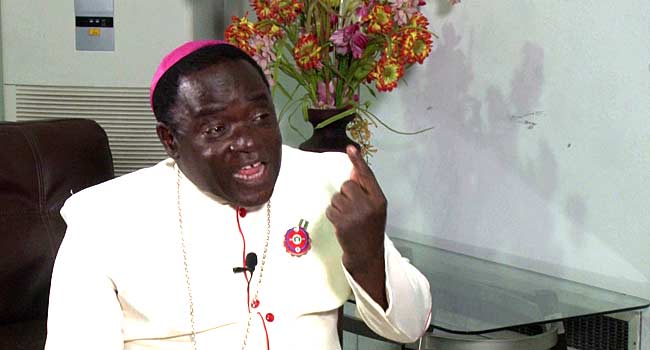BUSINESS DAY
In a recent address, the Bishop of Sokoto Diocese, Mathew Hassan Kukah, articulated his apprehension regarding what he termed the “ubiquity of the military in our national life.”
Expressing concern over the pervasive presence of soldiers across the nation, he questioned the compatibility of such a scenario with the essence of a civilian democracy. Kukah characterized the situation as akin to an “army of occupation,” with military personnel seemingly omnipresent across all states and Abuja.
Speaking further, Kukah emphasized the potential repercussions of this militarization, particularly in fostering what he referred to as the ‘see finish’ syndrome, a term echoed by the former Chief of Defence Staff, General Lucky Irabor. He underscored the significance of maintaining the professionalism and integrity of the military, cautioning against the erosion of its perceived role in safeguarding society.
Transitioning to matters of national security and leadership, Kukah lauded recent statements by political figures, including Tinubu’s stance on treating kidnappers as terrorists. However, he urged the President to take decisive action by setting a specific timeline for addressing insurgency. Critiquing Nigeria’s political leadership, he likened their actions to those of a drunken individual, emphasizing the need for a shift towards more responsible governance.
Despite the challenges facing the nation, Kukah expressed optimism about the prospect of brighter days ahead, citing his faith in God and the power of resilience embodied by Easter and Christianity. He called for unity and inclusivity in national policy frameworks, advocating for transparent recruitment processes and clear communication strategies to inspire confidence and accountability.
On the security front, Kukah urged for a comprehensive review of the nation’s security architecture, emphasizing the need to avoid diluting military professionalism through the enlistment of untrained groups. He stressed the importance of defeating insecurity with a strategic and concerted effort, highlighting the imperative of ending the cycle of blame and taking decisive action at all levels of governance.
Additionally, Kukah called for measures to reduce the overbearing costs of governance and to revitalize the agricultural sector as part of a broader strategy to enhance food security and restore dignity to Nigerian citizens. In essence, his message underscored the urgent need for proactive, inclusive, and accountable governance to navigate the challenges facing Nigeria towards a brighter future.
READ THE FULL STORY IN BUSINESS DAY



Connect with us on our socials: